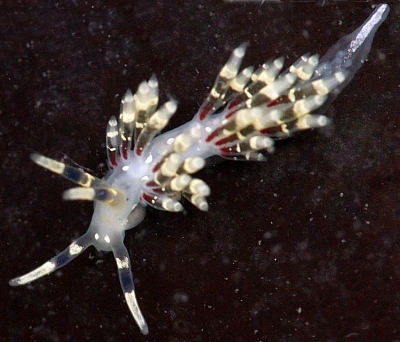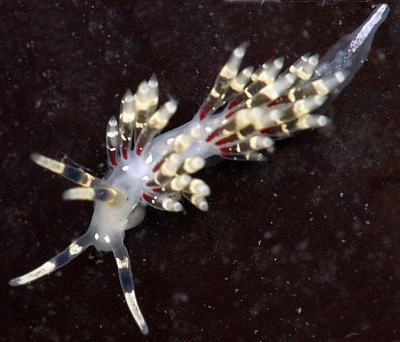
Cuthona abronia
(MacFarland, 1966)
Order: NUDIBRANCHIA
Suborder: AEOLIDINA
Family: Tergipedidae
DISTRIBUTION
East Pacific from Washington, USA to Baja California, Mexico (Behrens & Hermosillo, 2005).
PHOTO
Locality: Fitzgerald Marine Refuge, Moss Beach, San Mateo County, Mid-intertidal, California, USA, Pacific Ocean, 17 March 2007, Rocky tidepool in surgrass beds area. Length: 1.5 cm. Photographer: Ron Wolf.
This species has a characteristic pattern of cream white bands on the head tentacles and cerata. There is a dark purplish band about midway up the oral tenatcles and rhinophores. The ceratal digestive gland ranges from brown to green in colour except for the basal region which is often a reddish colour. There are some larger white spots on the body and a white band down the midline of the posterior foot. It grows to about 15 mm in length. Little is known of its biology.
-
MacFarland, F. M. (1966). Studies of opisthobranchiate mollusks of the Pacific coast of North America. Memoirs of the California Academy of Sciences, 6: 1-546, pls. 1-72.
Rudman, W.B., 2007 (March 22) Cuthona abronia (MacFarland, 1966). [In] Sea Slug Forum. Australian Museum, Sydney. Available from http://www.seaslugforum.net/find/cuthabro
Related messages
Cuthona abronia from California
March 24, 2007
From: Ron Wolf

Here's one that does not appear to be in the species list.
Locality: Fitzgerald Marine Refuge, Moss Beach, San Mateo County, Mid-intertidal, California, USA, Pacific Ocean, 17 March 2007, Rocky tidepool in surgrass beds area. Length: 1.5 cm. Photographer: Ron Wolf.
Ron Wolf
rwolf@ascribe.org
Wolf, R.E., 2007 (Mar 24) Cuthona abronia from California. [Message in] Sea Slug Forum. Australian Museum, Sydney. Available from http://www.seaslugforum.net/find/19711Dear Ron,
You are absolutely correct. This species is not one we would call common on the Pacific coast of the US. It is however, very beautiful. Your shot here clearly shows the characteristic purple band on the rhinophores and oral tentacles. I also note the characteristic red base to the cerata. Perfect.
Unfortunately that is about all we know about this tiny species. Any careful observations are welcome.
Thanks for sharing this,
Dave Behrens
